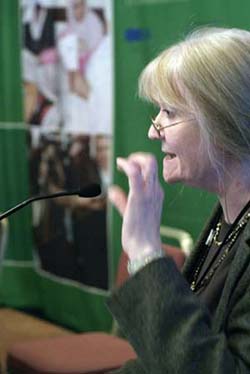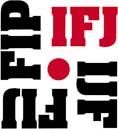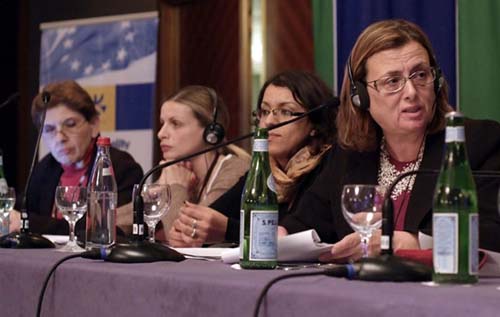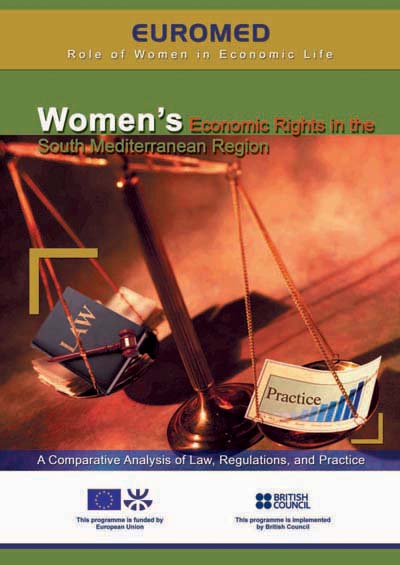Euromed women need legislative reforms and changes in mindsets to undo centuries of gender inequality and economic marginalization, but should push harder to publicize their cause.
Media expert Naomi Sakr advised participants at a Euromed policy conference in Brussels to use the media as a change agent to promote Mediterranean women's economic rights, rectify prejudices, close gaps and redress discrimination.
"Rather than policing the media, feminists should push for more diversity," said Sakr, the director of the London-based Arab Media Center at the University of Westminster. "The greater the diversity of characters and narratives, the harder it becomes to say this is positive and this is negative."
 Naomi Sakr (Deneyer)
Naomi Sakr (Deneyer)
Her advice dovetailed with the release of guidelines for reporting violence against women by the International Federation of Journalists (www.ifj.org) that call on reporters to accurately identify such violence; to use non-judgmental language; not to identify recipients of violence as "victims," unless they use the term themselves; and, to ensure that interviews meet survivors' needs.
The IFJ guidelines, marking the international day for the elimination of violence against women, also urged journalists to treat survivors of violent acts with respect; to use statistics and background information in the proper context; to tell the whole story; to maintain confidentiality; to use local resources; and, to provide useful information.
 IFJ logo
IFJ logo
"The story of violence against women needs to be told with sensitivity, professionalism and depth," said Aidan White, Secretary General of the IFJ. "Too often media choose sensationalism and stereotypes instead of providing realistic, inclusive and accurate reporting of the horrifying scale of this problem."
According to Sakr, the plethora of media and platforms provide challenges and opportunities for activists wishing to promote their causes effectively.
It's an uphill battle for those unaccustomed to marketing, notably in an un-hospitable financial environment where donor fatigue has set in and NGOs are struggling to stay alive. Euromed activists will have to be more pro-active, creative, rely heavily on new media, and through those outlets develop extensive networks, to get the message across, Sakr said.
She said the Internet enabled people with limited resources to run radio stations and use foreign servers to circumvent censorship or government restrictions on issuing broadcast licenses.
A case in point is AmmanNet (www.ammannet.net) with its online directory of Arab women development experts, serving as a source of interviewees for journalists.
Sakr's comments, during the two-day "Women's Economic Rights: Making a Difference in the Mediterranean Euromed Policy Conference" in the Belgian capital (http://www.roleofwomenineconomiclife.net/?PageId=56), resonated with the participants.
She referred to a resource called "Mission Possible: A Gender and Media Advocacy Toolkit" (http://www.un-instraw.org/wiki/training/index.php/Mission_Possible:_A_Gender_and_Media_Advocacy_Toolkit) to help teach activists how to hold the media accountable for their coverage of women.
The resource complements the Global Media Monitoring Project (www.whomakesthenews.org) that relies on groups to monitor media in their respective countries on the same day across the world.
Findings are then published to highlight good and bad practices, particularly the marginalization of women in the news compared to the perceived overwhelming presence of men.
 Euromed Women's Economic Rights Media Panel (Deneyer)
Euromed Women's Economic Rights Media Panel (Deneyer)
Yasmina Medani of Algeria's National Association of Women in Communication said women had achieved relative progress in her country, but their decision-making roles remained limited.
They also experienced inequality in promotions and social security, and had to deal with sexual harassment, given the absence of an organization for women journalists.
Myria Vassiliadou, Secretary General of the European Women's Lobby in Cyprus, said despite the lobby's Euromed and media program that includes gender equality as a component, the information was not easily accessible.
She stressed the need for accountability of the media in the portrayal of women and the importance of diversity; women's presence as media owners and decision makers; and more content on women's issues.
As a panelist, I recommended the following to bridge the disconnect between women's groups and the media:
Cut out the rhetoric and get to the point. Simplify ideas. Minimize or eliminate jargon, acronyms and abbreviations. Keep statistics simple and use visuals. Think cross-platform and rely heavily on online and social media, Facebook, YouTube, Twitter, cell phones. Learn to use the technology as it reaches more people than publications. Market more aggressively and learn about journalists' deadlines. Learn to talk in sound bites. Use keywords.
I also asked: "How are you different from everything else out there? Why should a journalist bombarded by thousands of messages care about your message? How does it affect the journalist? Because if it does, she/he will convey that message to the general public. What do you want people to do about it? And what will it cost?"
Conferees agreed on the need for a communication strategy before launching a program and the importance of working with media from the outset. They also focused on education of the media, media literacy in schools and training.
The conference coincided with the release of a 67-page comparative analysis of law, regulations and practice on women's economic rights - or the lack thereof -- in the South Mediterranean region by consultant Nadia Hijab and socio-economist Camilia Fawzi El-Solh.
 Hijab and El-Solh conducted an extensive study touching on laws, the right to education, the right to work, equal rights within marriage and the family, the right to social security, benefits and allowances, the right to nationality, and the freedom of movement.
Hijab and El-Solh conducted an extensive study touching on laws, the right to education, the right to work, equal rights within marriage and the family, the right to social security, benefits and allowances, the right to nationality, and the freedom of movement.
While media are beginning to make inroads on women's economic rights in the Euromed region, they have a long way to go to rectify the existing disequilibrium.
